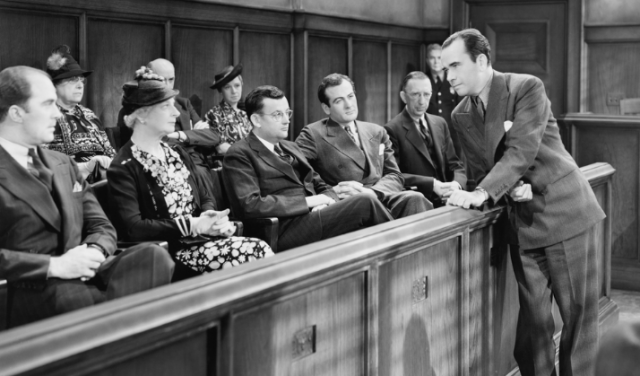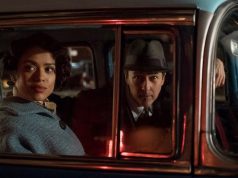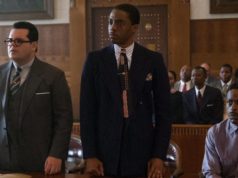
One of the great privileges we have as Americans is the right to complain about being called for jury duty, and to try every reasonable method of weaseling out of it. This process is fundamental to our judicial system. As stated by the Seventh Amendment to the Constitution: “In all criminal prosecutions, the accused shall enjoy the right to a speedy and public trial by an impartial, reluctant jury composed of citizens resigned to just getting it over with.”
I was recently afforded the opportunity to take part in this venerable tradition. At the ripe old age of 38, I feel like I’m lucky to have avoided it for as long as I did. (Living under an assumed name, never registering to vote, and burning all correspondence from the government probably helped.) But when the call came, I did my civic duty, for the same reason we all do it: because we’re proud to be Americans, and because we don’t have a choice.
Here in Portland (maybe all of Oregon? Don’t know, don’t care), the way it works is that you get summoned for two consecutive days. For those two days, you belong to the court, no matter what. If there are no cases that need juries, I think they can assign you to janitorial work. You sit in this big room with about 200 other people, and if you’re selected for a jury, you’re on it for as long as the trial lasts. If it gets done in one day, you still have to come back the next day to sit in the jury room again, and potentially be chosen for another jury.
It’s a lot like being in the audience at “The Price Is Right.” Maybe you go the whole time without being called. Or maybe you get called early on the first day, spend some time in Contestants’ Row, and never get any further than that. Maybe you actually get onstage, lose your game quickly, do poorly at the Big Wheel, and return to anonymity. But there’s an important difference between jury duty and “The Price Is Right.” When you’re on “The Price Is Right,” there’s no chance that you’ll be required to come back and be on “The Price Is Right” every day for the next month, or that the maximum value of the prizes you could win is $25 a day, or that the game could potentially end with you sentencing one of the models to death. Although that would be amazing.
The most onerous part of jury duty, it will not surprise you to learn, was that I had to be at the downtown courthouse by 8 a.m. If there’s anything worse than being told you have to do something boring for two days, it’s being told you have to start doing it at 8 in the morning.
After being checked in and given “JUROR” lanyards to wear so that people in the hallways would know not to confess crimes to us, we were shown a brief introductory video. This video, called “Justice for All,” features actual judges, attorneys, and jurors expressing the general sentiment that jury duty is important and you should show up when you are summoned for it. Which we had all done, of course. That’s how we were able to see the video telling us how important it is that we do it. Everyone who skipped jury duty that day missed out on the video informing them of how crucial it is that they not skip jury duty.
There’s wifi in the big jury room, and you’re allowed to bring your laptop or iPad, so you don’t have to be totally bored while you sit there all day. Nothing happened till after our lunch break (they give you a break from not doing anything so you can go outside and not do anything), when they dismissed a few dozen people for the day and called another few dozen to report to a courtroom. I was part of the latter group. I was maybe going to be on a jury, for reals!
To an outsider, especially an apathetic and inattentive one like myself, this whole system seems inefficient. The reason they have so many people in the jury pool is to ensure there are enough jurors for whatever trials happen that day, even if a lot of people have to be disqualified or excused. That makes sense. What I don’t understand is why they don’t know ahead of time how many trials there are going to be on any given day. There seemed to be no way of predicting it, like trials sometimes just pop up unexpectedly, and whoops, gotta find a jury! I always assumed court scheduling was more precise than that. Are prosecutors and defenders showing up at the courthouse unannounced, demanding spur-of-the-moment trials? Are defendants being told to just stop by any weekday between 9 and 5 for their trials, take a number, and wait? I feel like we could narrow this down a little better.
Anyway, about 35 of us were ushered into a smallish courtroom, where the prosecutor, defender, and defendant already sat. The judge entered, and things got rolling. The charges were read. The defendant, a white male in his 40s, was charged with burglary in the first degree, and with possession of heroin. Looking at him, I thought: Yep, this is definitely a man who has possessed heroin. Were it not for the fact that we were in a courtroom, I wouldn’t have been surprised to learn he possessed heroin at that very moment. Of course, what mattered wasn’t whether he’d EVER had heroin — which he plainly had, and a lot of it — but whether he possessed heroin on the night in question, when he was allegedly caught allegedly breaking into the garage of a house in the part of town where people who need money to buy heroin frequently commit crimes.*
The judge said the trial would only take one day, and I began to strategize. I was committed to jury duty for a second day anyway. It was therefore in my best interest to get chosen for this jury, since otherwise I’d go back to the jury pool and possibly be selected for a different trial that would last longer. I had done plenty of reading on how to not be selected for a jury — act like a know-it-all, claim to have been a victim of the same crime the defendant is charged with, urinate on the jury box to mark it as “yours” — but not much research on the opposite goal. All I could do was answer the questions they asked me and hope one of them wasn’t “Did you assume the defendant was a habitual heroin user the minute you saw him?”
Well, whatever I did or didn’t do, it worked. I was one of three men and nine women selected for the jury — “empaneled,” in legal terms, from the Latin “empanada,” meaning “a delicious stuffed bread or pastry served to juries.” They hustled the twelve of us, like children, into our own little jury room so the grown-ups could keep talking about things that we weren’t allowed to hear. (Probably sex stuff.) In the jury room, a few jurors kept to themselves and read books or looked at their phones, but most of us chatted. One juror, a lithe young woman in her early 20s who reported that she was a dance student, said, “I’m just glad I could do my civil duty.” She was my immediate favorite.
After a while, we were led back into the courtroom and told to go home for the day. There were some kinks that had to be ironed out, and the trial would commence the next morning. I told everyone to watch “12 Angry Men” as homework and got a disappointing number of blank stares in response.
When we returned the next morning, we received the disappointing news that our defendant had made a plea bargain and the case was over. He pled to criminal trespass in the second degree (which is less illegal than burglary in the first), plus the heroin possession (which I guess there wasn’t much dispute over). He paid a fine, was put on probation, and had to enter a rehab program — which, the judge told us, is what the man really needed in the first place. I mean, he also needed to not break into people’s garages, obviously. But the underlying problem was the drug addiction.
My eleven new friends and I were sorry we wouldn’t get to sit in judgment of one of our fellowmen — something I’d been practicing my entire life for! — but we were glad the system was trying to help the guy rather than just lock him up and forget about him. Let’s save prison for the truly dangerous criminals, like people who force you to be downtown at 8 a.m. on a Monday.
*Yes, Portlanders, I mean SE 82nd.




